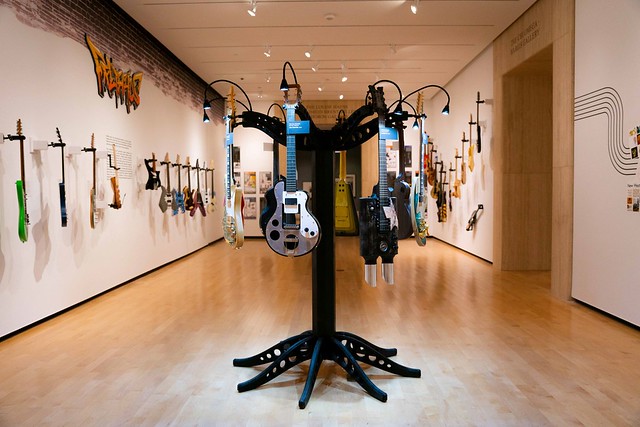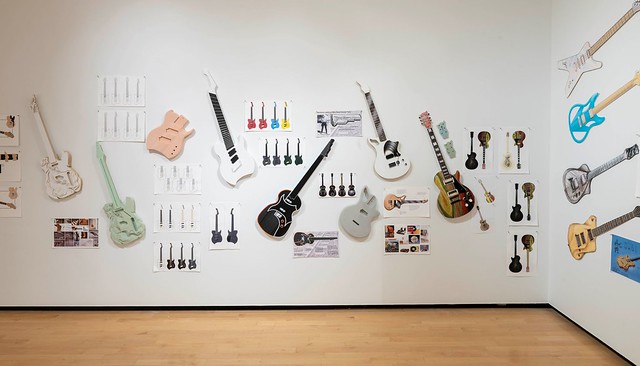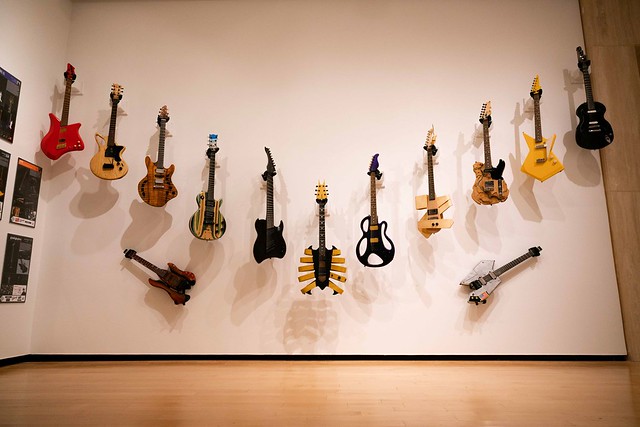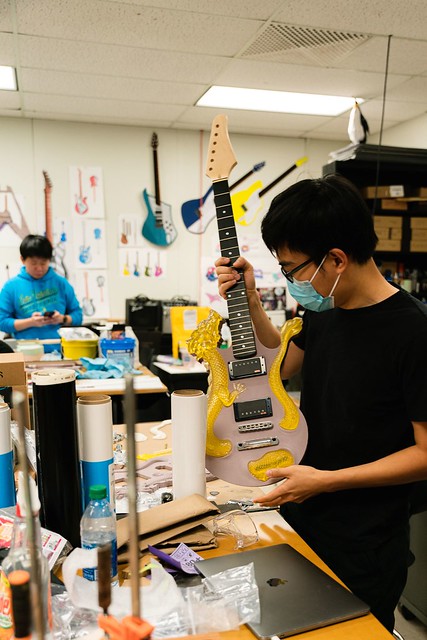Auburn’s art museum exhibiting guitars by alumni, faculty, students
Article body
“FretHaus,” a guitar exhibition combining art, design and function, is on view at the Jule Collins Smith Museum of Fine Art at Auburn University through July 31.
For the first time, the museum is partnering with the School of Industrial and Graphic Design in Auburn’s College of Architecture, Design and Construction on the exhibition content, design and programming. Students in the 2022 senior thesis design studio conceptualize, prototype and ultimately produce fully functional guitars with a rock-n-roll-edge. The exhibition also features work from Professors Rich Britnell and Keith Medley—a professor of practice, master luthier and product development manager for Gibson Guitars—and creations from previous years’ studios.
The title combines the word fret, a common guitar component, with the German word haus to echo the term Bauhaus, an influential art school founded in 1919 in Weimar, Germany. Auburn’s nationally ranked Industrial Design program is rooted in the subsequent modern movement. Students taught by original Bauhaus faculty members established the Auburn program in 1945, making it one of the oldest in the country.
“Guitars are built on tradition. FretHaus is here to break that,” said Britnell, who directs the studio in the School of Industrial and Graphic Design. “Tradition often lacks innovation. As industrial designers, our purpose is to innovate.”
Whether a musical instrument, a product or a service, all industrial designers conceptualize before exploring materials. They revise and problem-solve for optimal appearance, functionality and manufacturability.
“The program also fosters collaboration,” Britnell said. “Students gain real-life experience by working with Professor Medley and other representatives from companies such as Gibson Guitars and EMG Inc.”
Malinick said university collaborations that support instruction, research and outreach are top priorities leading into the museum’s 20th anniversary in 2023.
“With this exhibition, we invite the industrial designers as co-learners alongside the museum team,” said Cindi Malinick, the museum’s executive director. “As the cultural heart of a public research university, we seek to work alongside all colleges, no matter the discipline, to experiment and support the fluid exchange of ideas.”
Adam Kennedy of Charlotte, North Carolina, developed his concept from observing musicians on stage and noting a solution. “The concept was to create a modular guitar that would eliminate the need for multiple guitars on stage by allowing for interchangeable pickups,” Kennedy said. “This idea came to me watching live shows and seeing two- to three-minute intervals to change guitars and settings when the time could be reduced to almost 30 seconds.”
Kennedy’s guitar finish is a collage of posters by Wes Wilson, who designed iconic artwork for the Grateful Dead and Jefferson Airplane.
“Museum visitors will see insightful, playful, technical and futuristic creations and the artist’s words and inspirations,” Malinick said. “We are sure the exhibition will prompt broad thoughts and conversations, including which guitars are surprising and what materials reveal about the artist and our culture.”
Located on Auburn University’s campus at 901 S. College St., the Jule Collins Smith Museum of Fine Art is open free of charge from 10 a.m. to 4:30 p.m. CT Tuesdays through Sundays, with extended hours until 8 p.m. on Thursdays. Auburn University’s art collection includes mid-20th century American modernism, Mexican modernism, contemporary prints and photographs, works on paper depicting the South, ceramics and Southern visionary art.
Donations to the museum are made through the Auburn University Foundation. For more information, visit jcsm.auburn.edu or call 334-844-1484.
Related Media
Media interested in this story can contact Communications Director Preston Sparks at (334) 844-9999 or preston.sparks@auburn.edu.
Auburn University is a nationally ranked land grant institution recognized for its commitment to world-class scholarship, interdisciplinary research with an elite, top-tier Carnegie R1 classification, life-changing outreach with Carnegie’s Community Engagement designation and an undergraduate education experience second to none. Auburn is home to more than 30,000 students, and its faculty and research partners collaborate to develop and deliver meaningful scholarship, science and technology-based advancements that meet pressing regional, national and global needs. Auburn’s commitment to active student engagement, professional success and public/private partnership drives a growing reputation for outreach and extension that delivers broad economic, health and societal impact.










